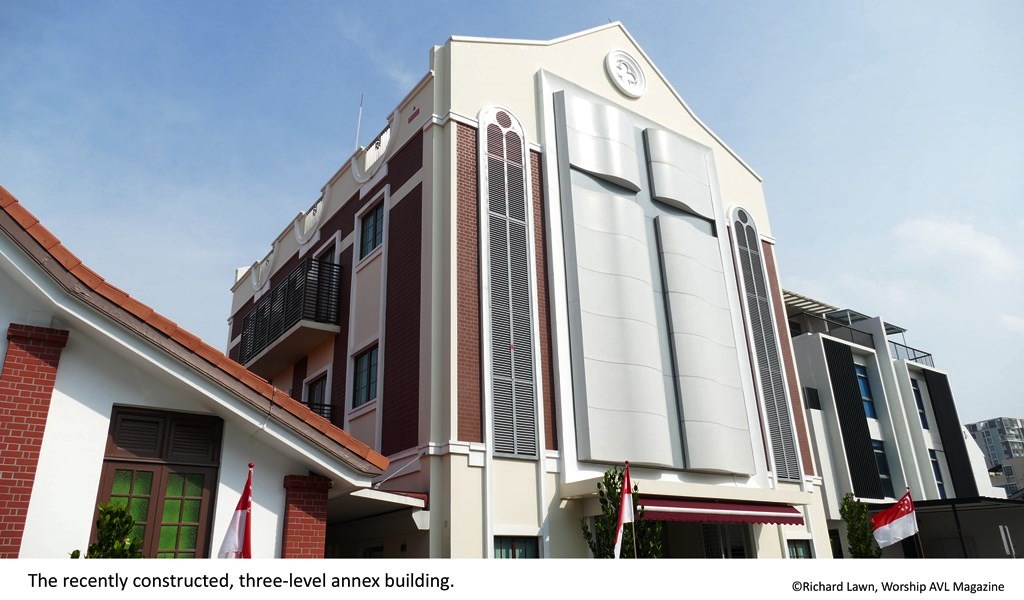
 ABOUT THE CLIENT
ABOUT THE CLIENT
View of service at Bethesda (Katong) Church at junction of Carpmael and Pennefather Roads. Completed at end of 1936, it is the first "branch" of the Brethren church in Singapore, the first main church being Bethesda Chapel at 77 Bras Basah Road. The history of the Brethen church here can be traced back to the mid 19th century when Philip Robinson, co-founder of Robinson and Company, first arrived.
Source: National Archives of Singapore
Bethesda Katong Church Upgrades AV and Lighting Technology
As Neighbourhood Churches in Singapore increase their memberships over time, the Sunday services and other weekly functions become more condensed and somewhat cramped. Making do with existing space becomes increasingly difficult and, with relocation out of the question, most churches are forced to consider expanding their onsite facilities. Built to serve their communities, these churches have to delicately grow without upsetting their neighbours.
Since opening its hall on 29 February 1936, Bethesda (Katong) Church has continued to expand on the Pennefather Road. In 1947, new wings were constructed on both sides of the main hall, and an adjacent property was acquired two years later. In 1973, renovations were made to the main church hall with the addition and completion of a two-storey wing with an auditorium for the expanding congregation.
CHALLENGES
The cramped resources proved too much and, following planning approval, the old annexe was demolished to make way for a new three-storey building with an attic and roof garden in 2016. ‘We wanted to build a four-storey annexe with attic and roof garden, but planning permission was denied,’ explains church volunteer, Vincent Chua. ‘Our services that are conducted in the main hall are traditional with just a piano and organ as accompaniment for worship. However, the audio system had fatigued over two decades and so we called upon the expert services of consultant Robert Soo.’
Arriving onsite, Robert conducted further research regarding the architecture of the heritage building. ‘Right down to the colour of the bricks, the pillars and the overhead wooden supports of the open ceiling, you’re not allowed to change anything,’ comments Robert. ‘Perhaps the most striking feature of all is that the church practises an open form of worship whereby any church member can participate in the worship service. That person can be on any floor of the annexe or within the main hall. Therefore, the entire congregation needs a visual on the speaker.’
SOLUTIONS
The solution was to create a video control system to support bidirectional broadcasting between the main hall and the three floors of the adjacent new annexe. Having installed the previous audio system in the late 1990s, Electronics & Engineering (E&E) once again won the tender to integrate Robert’s AV designs. A Panasonic PTZ camera system fulfils this unique aspect, for which AW-HE130 and AW-HE40 cameras are managed by AW-RP50 remote controllers in the main hall, in addition to annexe levels two and three together with the attic. The video operator selects a source on a Datavideo SE-2850 12-input switcher, as well as a Kramer 1616HD-3G 16×16 matrix switcher and RCP-1616 remote. The resultant image is then transmitted on to a 2.5mm pitch 3.84m x 2.4m LED screen and all other projector and TV displays within the two facilities.
For the ministry team onstage, an Epson EB-G7000W projector and Remaco PRO-3220 screen serve as a confidence monitor. Owing to the uneven ceiling profile and multiple pillars in the sanctuary, Robert opted to section the seating areas for their audio and video requirements. ‘It’s a form of zoning, even though my design focused on an even distribution of audio and video delivery.’ As such, E&E sensitively mounted four 65-inch LED displays on ceiling-suspended poles for the congregations seated towards the rear left and right walls. The video upgrade is completed with the addition of a Blackmagic Hyperdeck Studio Pro video recorder.
The spoken word services required improved intelligibility and, for this, Robert opted to create a distributed audio system rather than an L-R or L-C-R configuration normally associated with more contemporary services. ‘Consistency was key, so that the congregants would not be able to tell the difference in audio quality between different seats. The single L-R 15-inch speakers are supplemented by two 12-inch models serving the left-hand seats and a further two on the right together with a final 12-inch model that has been vertically orientated for the rear centre seats. They provide enough low-frequency punch, so subwoofers weren’t required.’ Audio mixing is conducted on an Allen & Heath SQ7 digital console in the rear technical area, which is connected via Cat-6a cabling to an AR2412 audio rack and AR84 expander that receive the 32mic inputs onstage.
On-site Installation
IMPLEMENTATION
E&E project manager Ash Mo and his team fulfilled Robert’s requirements by installing L-R EAW MK5364i two-way speakers together with five 12-inch models in the form of EAW MK2364i and MK2394i cabinets for the lateral and rear seats, respectively. Powered by Ashly LR4000 amplifiers, DSP configuration has been set within the software settings of two Ashly Protea 4.8SP four-in/eight-out processors. The ministry leaders onstage are equipped with Shure ULX-D wireless mics including an MX153 T headworn model, while the grand piano is reinforced with a pair of DPA d:vote 4099P condensers. Four EAW VFM109i wedges are also at their disposal for monitoring.
The simple Sunday services have been enhanced with three lighting bars, fitted with a combination of ACME E300 spot LED profiles, TS-150 Fresnels, MP-12FC washes and XA-400 LED spot moving heads, which are controlled from a Chamsys Quick Q20 lighting controller.
The traditional manner of the three church services taking place in the main hall contrasts with the adjacent annexe, which hosts Sunday school. Here, Robert was charged with creating a more contemporary and musical setting. ‘The three levels roughly cover the same footprint and are extremely compact,’ explains Robert. ‘Owing to the multipurpose requirements of the two main annexe levels, the church opted to add partition screens. Each sub-section requires its own dedicated audio and projection. Given the limited ceiling space and the restrictions of where you could suspend projectors and speakers owing to cabling and air conditioning units, this was always going to be a challenge.’
E&E accepted the challenge. Levels two and three mirror one another in terms of their setups, where the same EAW 15-inch MK5364i speakers are fixed in an L-R configuration. Ashly amplification and DSP make a repeat digital intercom system supports the technical staff operating in the main hall, as well as on all four levels of the annexe, for which nine connections and five key panels support HS-6 handsets and FSII beltpacks.
‘The project was delayed by over a year, between phase one and two due to prevailing government approval processes, so we worked hand-in-hand with all stakeholders closely over a four-month period to complete the final phase of the project on time and to enable the handover as a whole,’ explains E&E project manager, Ash Mo. ‘Despite the replication of equipment that was installed on all four levels, these are far from cut and paste installs as each level varied in terms of requirements and challenges. The rooms are physically limited in size and the added partitions on levels two and three severely limited our options for installing the projection, lighting and speakers.’
From a Leap Year day opening to a giant step forward in terms of AV and lighting technology, Bethesda Katong Church is writing a new chapter into its rich history.
Photo Credit: Bethesda (Katong) Church
Publications






